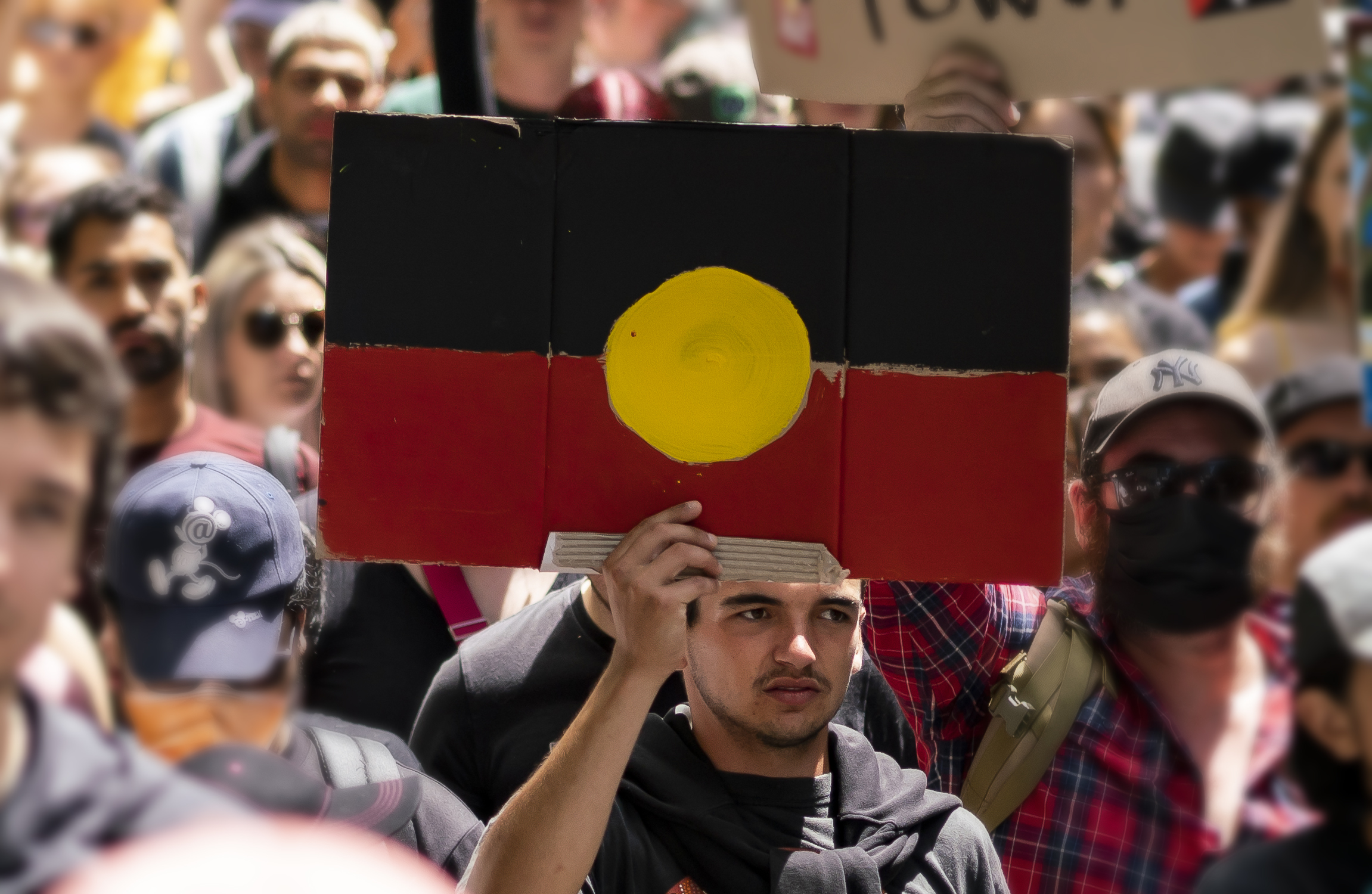On 14 October, Australians will vote on establishing a government advisory body for matters relating to the country’s Indigenous population, which would be enshrined in the constitution. At the time of writing, support for this ‘Indigenous Voice’ to parliament is languishing in the polls, much to the distress of the liberals. In reality, however, neither the government’s feeble, reformist Voice, nor the unvarnished racism of the opposition, offers anything to Australian workers, Indigenous or otherwise.
Last summer, Prime Minister Albanese announced the wording for an amendment in the Australian Constitution that would enshrine this new body in law, subject to a referendum. At the time, he thought this was an easy political win for his government.
Australia is being hit by the same headwinds buffeting capitalism internationally. Rising interest rates are making it more expensive for businesses and households to borrow, whilst opening up a hole in federal government finances. Meanwhile, the sharp slowdown in China – by far the biggest market for Australia’s exports, making up 34 percent of its total – is an ever-looming threat.
The idea of introducing a wholly symbolic ‘Indigenous Voice’ to parliament was therefore a cheap reform at a time when anything of actual substance has been rendered unaffordable for the capitalist class. And Albanese saw this as a safe bet. At the time of its launch last year, polling indicated 65 percent of voters would back it. But this is one gamble that has now backfired massively as support for the ‘Yes’ vote has plummeted to 41 percent.
Instead of an easy win for Albanese – a win that would ultimately do nothing to help Indigenous people in Australia – both campaigns, representing two wings of the ruling class, have turned the whole thing into a poisonous part of their reactionary culture war.
What would the Voice to parliament do?
The question on everyone’s lips, since the referendum was announced, has been: what is this proposed Indigenous Voice? This is unsurprising, as both the pro-Voice ‘Yes’ campaign and the anti-Voice ‘No’ campaign have littered their statements with contradictory answers to this very question, obscuring the truth.
According to the Australian government website, the Voice would be a body made up of Aboriginal and Torres Strait Islander people, which would “make representations to the Parliament and the Executive Government” on matters relating to these communities. This remit is intentionally vague, as it allows supporters of the Voice to exaggerate its potential impact, whilst not forcing the government to commit to any specifics.
In reality, despite the ardent ambiguity of the government and the incessant fearmongering and obfuscation by the opposition, the impact of an Indigenous Voice would be exceptionally minimal.
There are already dozens of similar bodies for all kinds of issues, which provide advice to the government on the basis of precisely the same processes. While on paper the scope of the Indigenous Voice would be more significant than that of ‘The Hip and Knee Advisory Group’ or Australia’s ‘Scallop Management Advisory Committee’, it is certain that its ultimate role would be the same – to write voluminous reports to be left ignored on the desks of various parliamentarians.
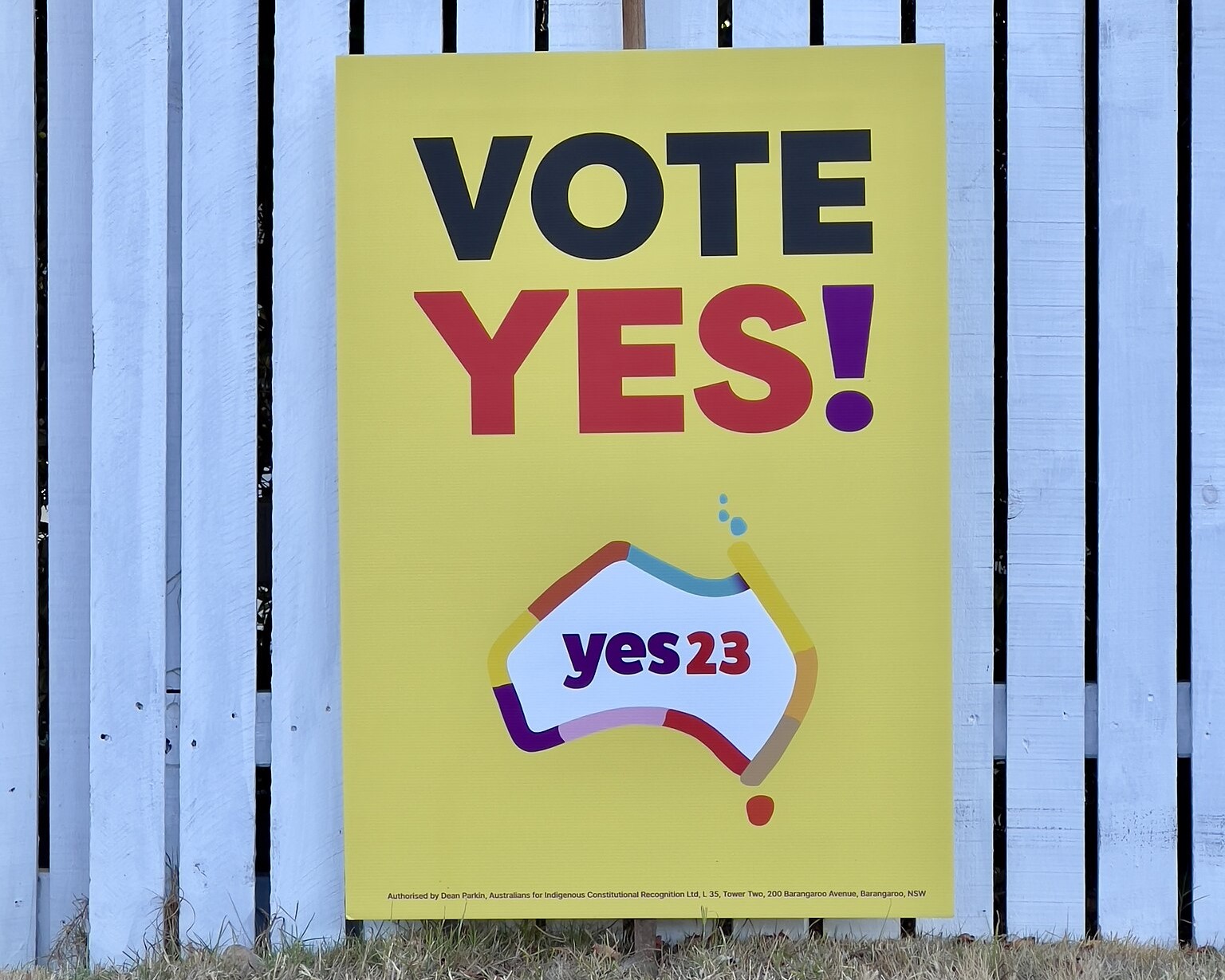 The empty and symbolic nature of the Voice has been made all but explicit by the government itself / Image: Kgbo, Wikimedia Commons
The empty and symbolic nature of the Voice has been made all but explicit by the government itself / Image: Kgbo, Wikimedia Commons
The fact that this particular body would be enshrined in the constitution should the referendum pass is merely a fig leaf that covers its lack of authority. It will do nothing to stop the Voice being swamped and rendered inert by the state bureaucracy. And all this is before we establish how the composition of the Voice will be selected. Will it be selected from a layer of well-to-do Indigenous businessmen, or from the impoverished majority?
The empty and symbolic nature of the Voice has been made all but explicit by the government itself. Prime Minister Anthony Albanese has described the Voice as “a modest request”, and has actually sought to downplay the idea that this would lead to any more substantial measures (such as reparations) in order to reassure the right wing!
In fact, many government departments – from Environment to the Arts – already have Indigenous advisory committees, and yet these have been unable to prevent the further exploitation and oppression of Australia’s Indigenous peoples.
Only last month, the Aboriginal Cultural Heritage Act 2021 – written in conjunction with Indigenous groups – was simply overturned by politicians in Western Australia. This was despite the law having been introduced to protect the history and culture of Indigenous Australians in the state, after mining conglomerate Rio Tinto blew up a 46,000 year old Indigenous heritage site in Juukan Gorge. Evidently the Australian ruling class are only willing to listen to oppressed people’s advice when it doesn’t get in the way of their profits.
Right-wing bigotry
While the official ‘Yes’ campaign offers little more than abstract “hope”, “unity” (read: cross-class unity) and the inspiring opportunity to “save [the government] money”; the ‘No’ campaign has been characterised almost in its entirety by racist bigotry and culture war scaremongering. In fact, the whole referendum has been an absolute gift to the right.
The right-wing Liberal-National Opposition has used the referendum to dredge up any and every culture war topic imaginable; from the claim that it would give Indigenous people the power to abolish military commemorations, to the suggestion that it would force “everyday Australians” to pay reparations through increased taxes.
Leading ‘No’ campaigner and right-wing MP Jacinta Price stated earlier this month that there are “no ongoing negative impacts of colonisation”, meanwhile erstwhile politician and ‘No’ campaign strategist Warren Mundine claimed recently that “most Indigenous Australians are doing fine” and should therefore “move on” from worrying about the atrocities of Australia’s colonial history.
Opposition leader Peter Dutton claimed in May that the Voice would “re-racialise” Australia, adding that, “It will have an Orwellian effect where all Australians are equal, but some Australians are more equal than others.” In other words white Australians are apparently about to become second class citizens under the heel of the Indigenous community!
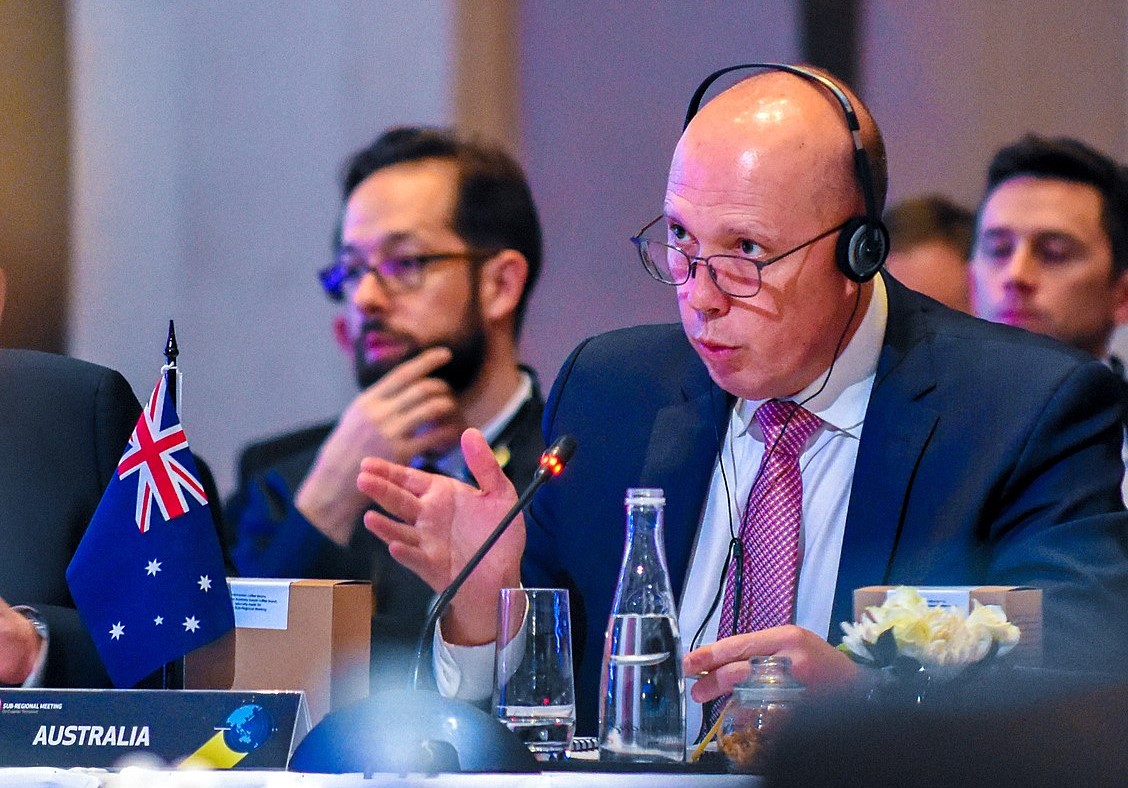 Opposition leader Peter Dutton claimed in May that the Voice would “re-racialise” Australia / Image: Australian Embassy Jakarta, Wikimedia Commons
Opposition leader Peter Dutton claimed in May that the Voice would “re-racialise” Australia / Image: Australian Embassy Jakarta, Wikimedia Commons
Central to the ‘No’ campaign’s propaganda is the claim that a constitutionally enshrined Voice would “permanently divide Australians, in law and spirit”. They ironically claim to be speaking in the name of equality! They conveniently keep quiet, of course, about the fact that Australia is already enormously divided: along racial lines, and above all along class lines.
These are the same reactionary, demagogic tactics that we have seen in recent years from the likes of Donald Trump and Boris Johnson. It is an attempt to split the working class and distract them from the real source of oppression and exploitation in the world today, which is the capitalist system.
Will the Voice referendum succeed?
In recent weeks the bourgeois media (mostly the infamous Murdoch press) has made much of the fact that the ‘No’ vote is gaining popularity. Indeed, unless there is a substantial turnaround in the coming weeks – which is unlikely – ‘No’ is projected to receive 51 percent of the vote, at time of writing, against 41 percent for ‘Yes’.
But while the right-wing ‘No’ campaign has attempted to inject culture war sentiments, a poll of those intending to vote ‘No’ last month found that almost 60 percent gave their primary reason as: “It won’t make a real difference to the lives of ordinary Indigenous Australians”.
This feeling is not restricted to ‘No’ voters, as the same poll found that only 17 percent of all voters believe the government is doing an “excellent or above average” job with the Indigenous Voice.
In fact, despite voting being mandatory in Australia, only 73 percent of eligible voters say they are “very likely” to head to the ballot box on 14 October. While this may sound high, it is far lower than the 91 percent who voted in Australia’s last referendum on Indigenous rights in the 1960s.
While the ‘No’ vote may be able to mobilise a certain layer through racist fear-mongering, this would not be enough to doom the Voice on its own. Much of the muted or hostile response to the Voice from the Australian public is the result of an antipathy towards the empty symbolism of the ‘Yes’ campaign and a general class anger against the layer of the establishment that is pushing it.
Undoubtedly, this is compounded by the active involvement of almost all of Australia’s largest corporations in the ‘Yes’ camp. The country’s four largest banks, four largest accountancy firms and two largest supermarkets have all made significant donations to the campaign, and have cynically seized on the issue in their marketing. Most hypocritical of all, however, is the support of mining companies such as the aforementioned Rio Tinto, who have given millions of dollars to the ‘Yes’ campaign to distract Australians from their crimes against Indigenous people.
It is unsurprising that, in a period of growing class struggle, few are being inspired by a campaign that calls for national unity between workers and bosses, between Indigenous Australians and the companies that destroy their culture and heritage.
How to fight racism
Far from unifying the country and providing an answer to the problems of Indigenous Australians, the Voice referendum has been used by two wings of the capitalist class in a reactionary manner to further their own ends.
The right-wing ‘No’ camp has used this to whip up jingoism, as they have done for decades, and insert a wedge to divide the working class artificially along lines determined by their culture war.
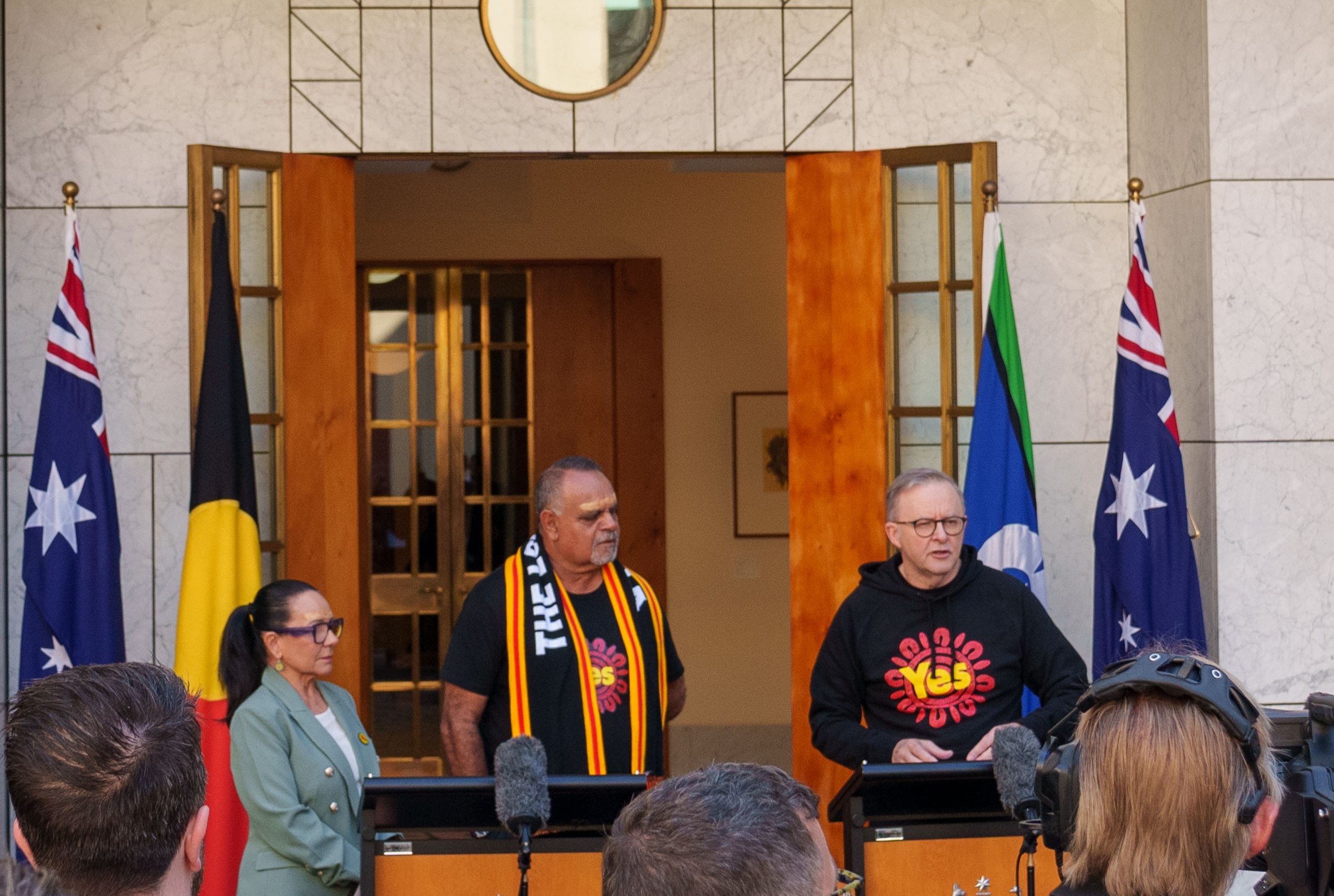 Racism is not fought by workers and youth lining up behind one wing of a reactionary capitalist class that has systematically fomented racism for decades / Image: Anthony Albanese, Twitter
Racism is not fought by workers and youth lining up behind one wing of a reactionary capitalist class that has systematically fomented racism for decades / Image: Anthony Albanese, Twitter
And the ‘liberal’ wing has also cynically used the campaign: on the one hand to whitewash the ruling class’ oppression of Indigenous people with purely gestural changes to the Constitution; and on the other hand to rally a section of the working class behind their side as the ‘lesser evil’. “Either vote for us on this question or Trumpism will come to Australia” is their message. In this sense, both wings of the ruling class are using the referendum to foment a culture war to divide society along artificial lines.
Undoubtedly, a victory for ‘No’ on 14 October will embolden a certain layer of the reactionary right, particularly in parliament. Some on the left, even some self-proclaimed ‘Marxists’, take this to justify a support for a ‘Yes’ vote, simply on the grounds of dealing a blow to racist right-wingers.
This, however, obscures the central point that racism is not fought by workers and youth lining up behind one wing of a reactionary capitalist class that has systematically fomented racism for decades. Rather, it can only be fought through class struggle and through the revolutionary overthrow of capitalism itself.
If we want to understand what needs to be done to really improve the lives of Indigenous Australians, we need to look at the conditions facing this layer of society. A report published in 2022 paints a dire picture of the living conditions of Australia’s Indigenous communities.
Suicide rates among Indigenous Australians are over double the national average and have increased over the last five years. Incarceration rates are ten times that of the national average and have increased in recent years. Indigenous Australians have a life expectancy 8-9 years lower than the national average. Almost 20 percent of Indigenous Australians are either homeless or living in overcrowded housing. In addition, the unemployment rate for Indigenous Australians is around four times higher than the official national average.
A symbolic committee that informs politicians about the suffering of Indigenous Australians will do nothing to resolve the underlying processes that cause and further this exploitation every day. In fact, these issues are already well known and regularly ignored by parliament.
Rather than relying on the capitalist state to solve the problems facing Australia’s oppressed and exploited, only the solidarity and unity of the working class can overcome racism and only an economy based on a rational, democratic plan can provide a lasting response to the inequality that pervades Australia.
Establishment in crisis
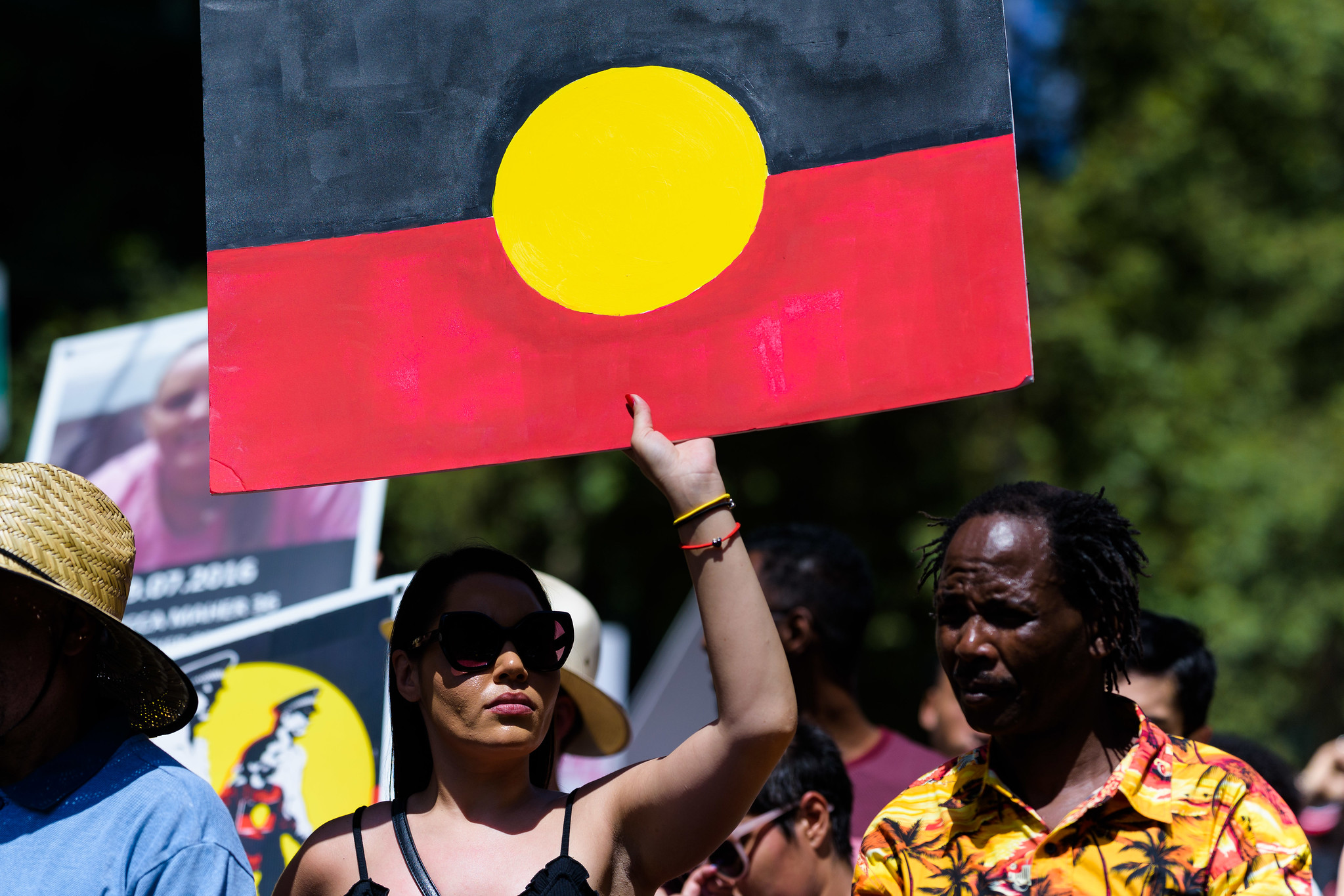 Although there is no political expression for the anger of the masses at the present moment, a social upheaval is being prepared / Image: julian meehan, Flickr
Although there is no political expression for the anger of the masses at the present moment, a social upheaval is being prepared / Image: julian meehan, Flickr
In a period of deep social and economic crisis for Australian capitalism, in which the Labor Party has struggled to afford even the most tepid reform, Albanese has predictably latched onto the idea of an inexpensive and unimpactful Voice.
As already stated, polling puts support for the government’s handling of the Voice at an abysmal 17 percent, yet even these woeful figures seem high compared to the low support for Labor’s approach to climate change (13 percent), the cost of living (9 percent), and housing affordability (8 percent).
These figures show a profound discontent among the masses and a deep anger against Albanese’s government. Despite the Liberal-National Coalition’s dominance within the ‘No’ campaign, the referendum has done little to inspire confidence in the opposition, which has continued to trail behind Labor.
This poses a serious problem to the Australian ruling class, who can no longer rely on either of its traditional parties to maintain stability. Although there is no political expression for the anger of the masses at the present moment, a social upheaval is being prepared. If and when the Voice referendum fails on 14 October, the Labor Party will no longer have a leg to stand on, but the opposition will fare little better.
In a country that has long been considered politically boring, the stage is being set for upheaval. No matter the fate of the Voice, the Australian ruling class will not be able to depend on the stability of the past. The task of the communists is to provide an expression for the discontent that is accumulating and to fight for an answer beyond the strangling limits of the capitalist system, for the benefit of all working class people, Indigenous and non-Indigenous alike. This is what the IMT is fighting for in Australia and worldwide. If you agree, join us.

